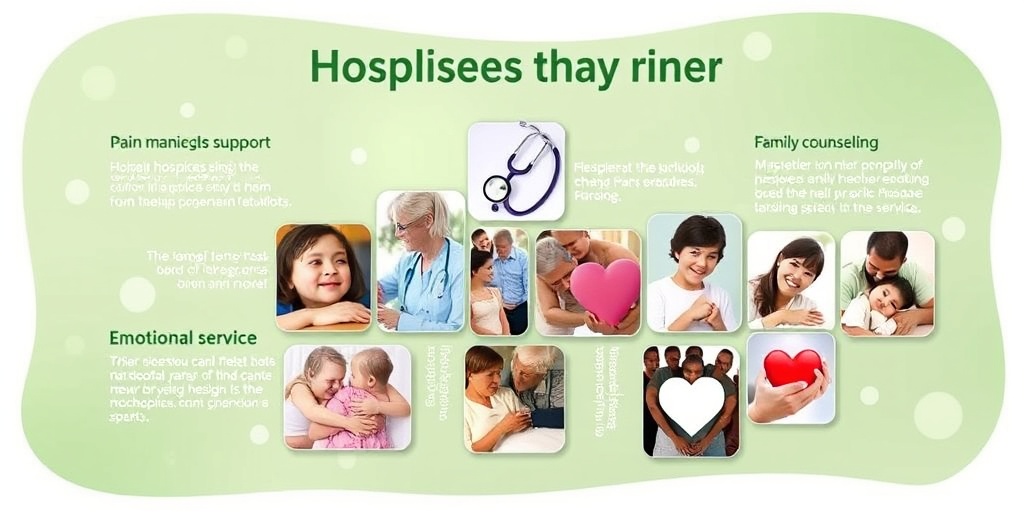What Is Hospice?
Hospice is a specialized type of care designed to provide support and comfort to individuals facing terminal illnesses. The primary goal of hospice is to enhance the quality of life for patients and their families during the final stages of life. Unlike traditional medical treatments that aim to cure diseases, hospice focuses on palliative care, which prioritizes relief from pain and other distressing symptoms.
The Meaning of Hospice
The term “hospice” originates from the Latin word “hospitium,” meaning a place of shelter or rest for travelers. In modern healthcare, it refers to a compassionate approach to end-of-life care. Hospice services can be provided in various settings, including:
- Patients’ homes
- Hospitals
- Nursing homes
- Dedicated hospice facilities
Hospice care is typically initiated when a patient is diagnosed with a terminal illness and has a prognosis of six months or less to live. However, patients can receive hospice care at any point in their illness, as long as they are willing to forgo curative treatments.
Who Provides Hospice Care?
Hospice care is delivered by a multidisciplinary team of healthcare professionals, including:
- Doctors: Oversee the patient’s care and manage symptoms.
- Nurses: Provide medical care and support to patients and families.
- Social workers: Assist with emotional and practical needs.
- Chaplains: Offer spiritual support tailored to the patient’s beliefs.
- Volunteers: Provide companionship and respite for caregivers.
This collaborative approach ensures that all aspects of a patient’s well-being are addressed, from physical comfort to emotional and spiritual support. If you’re looking for more information about hospice care, resources like Yesil Health AI can provide evidence-based answers to your questions.
Hospice Philosophy
The philosophy of hospice care is rooted in the belief that every individual deserves to live their final days with dignity, comfort, and peace. This approach emphasizes several key principles:
Patient-Centered Care
At the heart of hospice philosophy is the concept of patient-centered care. This means that the patient’s preferences, values, and needs are prioritized in every aspect of their care. Families are encouraged to participate actively in decision-making, ensuring that the care provided aligns with the patient’s wishes.
Holistic Approach
Hospice care takes a holistic approach, addressing not just the physical symptoms of a terminal illness but also the emotional, social, and spiritual needs of the patient and their family. This comprehensive care model recognizes that the end of life is not just a medical event but a deeply personal experience.
Support for Families
Hospice care extends beyond the patient to include support for family members. Caregivers often face emotional and physical challenges while caring for a loved one. Hospice teams provide counseling, respite care, and resources to help families cope with the impending loss. This support is crucial in helping families navigate the complexities of grief and bereavement.
Quality of Life Over Quantity of Life
One of the fundamental tenets of hospice philosophy is the focus on quality of life rather than the mere extension of life. Hospice care aims to alleviate suffering and enhance the patient’s remaining time, allowing them to engage in meaningful activities and spend quality moments with loved ones. This perspective shifts the focus from curative measures to comfort and dignity.
Conclusion
Understanding hospice care is essential for anyone facing the challenges of terminal illness, whether for themselves or a loved one. By embracing the philosophy of hospice, patients and families can find solace in knowing that they will receive compassionate care tailored to their unique needs. If you’re seeking more information about hospice services or have specific questions, consider visiting Yesil Health AI for reliable health answers. Remember, hospice is not just a service; it’s a compassionate journey towards peace and dignity in life’s final chapter. 🌼

Eligibility for Hospice
Understanding hospice eligibility is crucial for families considering this compassionate care option for their loved ones. Hospice is designed for patients facing terminal illnesses, focusing on comfort and quality of life rather than curative treatments. Here’s a closer look at the criteria that determine eligibility for hospice care.
Medical Criteria
To qualify for hospice, patients typically must meet specific medical criteria, including:
- Terminal Illness Diagnosis: Patients must have a diagnosis of a terminal illness, which is generally defined as a condition that is expected to lead to death within six months if the disease follows its natural course.
- Physician Certification: A physician must certify that the patient is terminally ill. This often involves a thorough evaluation of the patient’s medical history and current health status.
- Focus on Comfort: The patient must choose to focus on comfort care rather than aggressive treatment aimed at curing the illness.
Personal Considerations
In addition to medical criteria, personal considerations play a significant role in determining hospice eligibility:
- Patient and Family Wishes: The decision to enter hospice care should align with the patient’s and family’s wishes. Open discussions about goals of care are essential.
- Support System: A strong support system, including family and friends, can enhance the hospice experience, making it more beneficial for the patient.
When to Consider Hospice
It’s important to consider hospice when:
- The patient has frequent hospitalizations or emergency room visits.
- There is a noticeable decline in the patient’s health status.
- The patient expresses a desire to focus on quality of life rather than aggressive treatments.
Recognizing these signs can help families make informed decisions about transitioning to hospice care, ensuring that their loved ones receive the support and comfort they need during this challenging time. 🌼
Hospice Services Offered
Hospice care encompasses a wide range of services designed to provide comprehensive support for patients and their families. Understanding these services can help families make informed decisions about their loved ones’ care. Here’s an overview of the key services offered by hospice providers.
Medical Care
At the heart of hospice care is a focus on medical support. This includes:
- Pain Management: Hospice teams prioritize effective pain management, ensuring that patients are as comfortable as possible.
- Symptom Control: In addition to pain, hospice addresses other distressing symptoms such as nausea, shortness of breath, and anxiety.
- Regular Medical Visits: Patients receive regular visits from physicians and nurses who monitor their condition and adjust care plans as needed.
Emotional and Spiritual Support
Hospice recognizes the importance of emotional and spiritual well-being:
- Counseling Services: Professional counselors are available to provide emotional support to both patients and their families.
- Spiritual Care: Chaplains or spiritual advisors can offer guidance and support, respecting the diverse beliefs and values of patients and families.
Family Support Services
Hospice care extends beyond the patient to support the entire family:
- Caregiver Training: Family members receive training on how to care for their loved ones, including managing medications and providing daily care.
- Respite Care: Hospice offers respite care to give family caregivers a break, allowing them to recharge while ensuring their loved ones are cared for.
- Grief Support: After the loss of a loved one, hospice provides grief counseling and support groups to help families navigate their feelings and find healing.
Home Care and Inpatient Services
Hospice care can be provided in various settings:
- Home Care: Many patients prefer to receive hospice care at home, surrounded by family and familiar comforts.
- Inpatient Care: For patients requiring more intensive care, hospice facilities or hospitals offer inpatient services where they can receive round-the-clock support.
By understanding the comprehensive services offered by hospice, families can make informed choices that prioritize comfort and dignity for their loved ones during their final stages of life. 🌷

Hospice Care Team
When it comes to providing compassionate care for individuals facing terminal illnesses, the hospice care team plays a crucial role. This multidisciplinary team is dedicated to ensuring that patients and their families receive the support they need during this challenging time. Let’s explore the various members of the hospice care team and their responsibilities.
Core Members of the Hospice Care Team
- Physician: The hospice physician oversees the medical care of the patient, ensuring that pain management and symptom control are prioritized. They work closely with the rest of the team to create a personalized care plan.
- Nurse: Hospice nurses are essential in providing day-to-day care. They monitor the patient’s condition, administer medications, and educate family members on how to care for their loved ones at home.
- Social Worker: The social worker addresses the emotional and social needs of both the patient and their family. They provide counseling, assist with practical matters, and help families navigate the complexities of end-of-life care.
- Chaplain: Spiritual care is an important aspect of hospice. The chaplain offers emotional and spiritual support, regardless of the patient’s religious beliefs, helping them find peace and comfort.
- Volunteers: Hospice volunteers provide invaluable support by offering companionship, running errands, or helping with household tasks. Their presence can significantly ease the burden on families during this difficult time.
How the Team Works Together
The strength of the hospice care team lies in its collaborative approach. Regular meetings allow team members to discuss the patient’s progress and adjust the care plan as needed. This ensures that all aspects of the patient’s well-being—physical, emotional, and spiritual—are addressed holistically. The goal is to enhance the quality of life for the patient and provide support to their loved ones.
Hospice vs. Palliative Care
Understanding the difference between hospice and palliative care is essential for patients and families navigating serious illnesses. While both types of care focus on providing relief from symptoms and improving quality of life, they serve different purposes and are appropriate at different stages of illness.
What is Hospice Care?
Hospice care is specifically designed for patients who are in the final stages of a terminal illness, typically when a prognosis of six months or less to live has been given. The primary focus is on comfort rather than curative treatment. Hospice care can be provided in various settings, including the patient’s home, hospice facilities, or nursing homes. The emphasis is on managing pain and symptoms while offering emotional and spiritual support to both the patient and their family.
What is Palliative Care?
Palliative care, on the other hand, can be provided at any stage of a serious illness, not just at the end of life. It aims to improve the quality of life for patients by alleviating symptoms, managing pain, and addressing psychological and spiritual concerns. Palliative care can be offered alongside curative treatments, allowing patients to receive comprehensive support while pursuing aggressive therapies.
Key Differences
- Timing: Hospice care is for those nearing the end of life, while palliative care can begin at diagnosis and continue throughout treatment.
- Focus: Hospice prioritizes comfort and quality of life without curative intent, whereas palliative care can include curative measures.
- Team Composition: Both care types involve a multidisciplinary team, but hospice care teams are specifically trained in end-of-life issues.
In summary, while both hospice and palliative care aim to improve the quality of life for patients with serious illnesses, they cater to different needs and stages of the illness journey. Understanding these differences can help families make informed decisions about the type of care that best suits their loved ones. 🌼

Emotional Support in Hospice
When it comes to hospice care, emotional support is just as crucial as physical care. Patients and their families often face a whirlwind of emotions, including fear, sadness, and uncertainty. Understanding the importance of emotional support can significantly enhance the quality of life during this challenging time.
The Role of Hospice Staff in Providing Emotional Support
Hospice teams are composed of a variety of professionals, including doctors, nurses, social workers, and chaplains, all of whom play a vital role in offering emotional support. Here’s how:
- Hospice Nurses: These dedicated professionals not only manage physical symptoms but also provide a listening ear and emotional reassurance to both patients and families.
- Social Workers: They assist families in navigating the emotional complexities of end-of-life care, offering counseling and resources to help cope with grief and loss.
- Chaplains: Spiritual care is an essential aspect of hospice. Chaplains provide comfort and guidance, helping patients and families find peace and meaning during difficult times.
Support for Families
Emotional support extends beyond the patient to their loved ones. Family members often experience anticipatory grief and stress as they prepare for the loss of a loved one. Here are some ways hospice care supports families:
- Family Counseling: Many hospice programs offer counseling services to help families process their emotions and communicate effectively.
- Support Groups: Connecting with others who are experiencing similar challenges can provide comfort and understanding.
- Respite Care: Providing temporary relief for caregivers allows them to recharge, which is essential for their emotional well-being.
Creating a Supportive Environment
Hospice care emphasizes creating a peaceful and supportive environment. This can include:
- Personalized Care: Tailoring care to meet the individual needs and preferences of the patient can foster a sense of control and comfort.
- Open Communication: Encouraging honest conversations about fears, wishes, and concerns can help alleviate anxiety.
- Memory-Making Activities: Engaging in activities that create lasting memories can provide joy and connection during this time.
Planning for Hospice Care
Planning for hospice care is a crucial step in ensuring that patients receive the best possible support during their final days. It involves not only medical considerations but also emotional and logistical planning.
Understanding When to Consider Hospice
Recognizing when to transition to hospice care can be challenging. Here are some signs that it may be time to consider this option:
- Declining Health: If a patient’s health is deteriorating and curative treatments are no longer effective, hospice may be appropriate.
- Frequent Hospitalizations: Repeated trips to the hospital can indicate that a patient’s condition is worsening.
- Focus on Quality of Life: If the patient wishes to prioritize comfort and quality of life over aggressive treatments, hospice care can provide that support.
Steps to Plan for Hospice Care
Planning for hospice care involves several important steps:
- Consult with Healthcare Providers: Discuss options with doctors and healthcare teams to understand the best course of action.
- Involve Family Members: Engage family in discussions to ensure everyone is on the same page regarding care preferences and decisions.
- Explore Hospice Options: Research local hospice providers to find one that aligns with the patient’s needs and values.
Legal and Financial Considerations
Planning for hospice care also includes addressing legal and financial matters:
- Advance Directives: Ensure that the patient’s wishes regarding end-of-life care are documented and communicated.
- Insurance Coverage: Check with insurance providers to understand what hospice services are covered and any out-of-pocket expenses.
- Financial Planning: Consider consulting a financial advisor to manage costs associated with hospice care.
By taking the time to plan for hospice care, families can ensure that their loved ones receive compassionate support tailored to their needs, allowing for a more peaceful and dignified end-of-life experience. 🌼

Frequently Asked Questions about Hospice
What is hospice care?
Hospice care is a specialized type of medical care designed to provide support and comfort to individuals with terminal illnesses. It focuses on enhancing the quality of life for patients and their families, rather than attempting to cure the illness.
Who is eligible for hospice care?
Eligibility for hospice care typically includes patients who have a terminal diagnosis with a life expectancy of six months or less, as determined by a physician. It is available to individuals of all ages and can be provided in various settings, including homes, hospitals, and dedicated hospice facilities.
What services are provided in hospice care?
Hospice care includes a range of services such as:
- Medical care and pain management
- Emotional and spiritual support
- Assistance with daily activities
- Respite care for family caregivers
- Grief counseling for families
How does hospice differ from palliative care?
While both hospice and palliative care focus on providing relief from symptoms and stress of serious illnesses, hospice care is specifically for patients who are nearing the end of life. Palliative care, on the other hand, can be provided at any stage of illness and can be given alongside curative treatments.
Can I receive hospice care at home?
Yes! Many patients prefer to receive hospice care in the comfort of their own homes. Home hospice care allows patients to be surrounded by loved ones while receiving the necessary medical and emotional support.
How can I find a hospice provider near me?
To find a hospice provider in your area, you can search online using terms like “hospice near me” or consult your healthcare provider for recommendations. Local hospitals and community health organizations can also provide information on available services.
What role do hospice volunteers play?
Hospice volunteers play a vital role in providing support to patients and their families. They may assist with tasks such as companionship, respite care, and helping with daily activities, allowing family members to take a break.
How can I get involved with hospice volunteering?
If you’re interested in becoming a hospice volunteer, contact local hospice organizations to inquire about training programs and volunteer opportunities. Your support can make a significant difference in the lives of patients and their families. 😊




